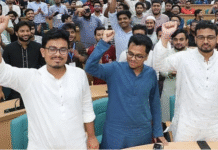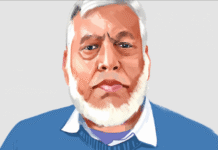
We are concerned that drug pedlars are seizing the opportunity of lax monitoring by law enforcement agencies to become active again in different parts of the capital during the ongoing lockdown. A report published in this daily on May 16 highlighted how drug trading has resumed in various densely populated areas some of which are Covid-19 hotspots, including Mohammadpur’s Geneva Camp, Karwan Bazar and Jheelpur slum in Mirpur. Regular raids by the police, Rab and the Department of Narcotics Control have stopped as a result of the lockdown, and the number of cases filed have decreased dramatically from 1,400 in March to 123 in April, according to the Dhaka Metropolitan Police.
We understand that the current situation poses great difficulty for law enforcement, and that conducting raids and searches pose health risks for all parties concerned. But given the uncertainty over when life would return to normal, law enforcement must strategise how to tackle the proliferation of drug trade in the capital despite the many challenges, if it wants to retain the progress it has made over the last two years in the war against drugs. Besides, with customers regularly visiting these Covid-19 hotspots, there are also concerns about rapid spread of the virus both within the slums as well as in the wider communities. Monitoring, while maintaining safety protocols, is thus of urgent importance.
The pandemic has had an adverse impact on the mental health of people from all segments of society. In the absence of any support system, some of them may turn to drugs to ease their pain and suffering. Policymakers should also address this lacking in our healthcare system both in the short and long term if it wants to eradicate the demand for drugs. Additionally, low-income groups, particularly women and children, who are desperate for money in this lockdown, are susceptible to being used as mules by drug lords. Previous reports have shown how, once one enters this trade, it becomes impossible to get out of the vicious cycle of arrests, poverty and unemployment. As such, it is also imperative to ensure social safety nets for these marginalised groups to ensure that they are not drawn into a life of crime and mayhem.









